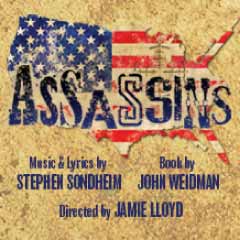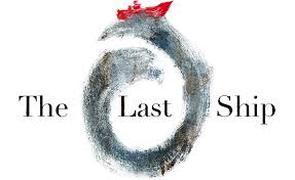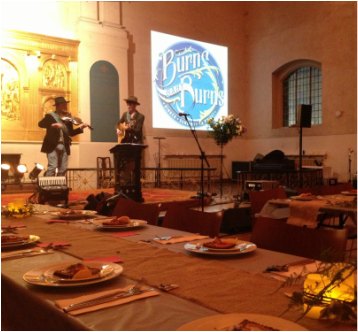 Sondheim's "Assassins" at the Menier: Creepy, Provocative, & Flawlessby Randi / January 7, 2015
Sondheim's "Assassins" at the Menier: Creepy, Provocative, & Flawlessby Randi / January 7, 2015 It’s a sad state on Broadway when small, lovely shows can’t succeed. Granted, if you are a tourist with time for only one show in NYC, you’re going to try for “The Lion King” or “The Book of Mormon” (unless you are Mormon) or “Beautiful” (because middle-aged ladies freaking love to sing along in that show, the horror). Tourists, the people that new shows need to attract, are understandably reluctant to risk limited time and money for unproven ventures like “Big Fish”, or the BSE® “The Bridges of Madison County”, or, this season, “The Last Ship”.
“The Last Ship” is the latest artistic casualty on Broadway, closing this past weekend after a short run of just under four months. It wasn’t great, but damn it was moving, lovely, and unique. It sounded like nothing else on Broadway now or in recent memory. Sting, yes that Sting, wrote the musical inspired by his childhood and the shipbuilding yards of the northern UK. His music for “The Last Ship” sounds like quintessential Sting: haunting, dark, but beautiful.
The crazy thing is, I hated the music when I first heard it last year. I attended the Tony Awards dress rehearsal, and along with my bff and my mom I was like, ‘ughhh Sting get off the STAGE this is TERRIBLE’! And then!! And then they had Sting rehearse his song a second time! They could have made Neil Patrick Harris do “Sugar Daddy” again or repeated the amazing “Gentleman’s Guide” number but nooo we had to listen to old Irish wailings twice? I was literally groaning and almost yelling at the people in charge. That’s how crazy I was. And it’s possibly the problem the show had in getting off the ground – the style of music isn’t easy to accept; it is not a recognizable Broadway style. You might not like it at first. But the second or third time, you fall madly in love and can’t stop listening to it or singing it. Maybe that’s what it takes to wrap your mind around something so new and so moving. Listen for yourself:
The crazy thing is, I hated the music when I first heard it last year. I attended the Tony Awards dress rehearsal, and along with my bff and my mom I was like, ‘ughhh Sting get off the STAGE this is TERRIBLE’! And then!! And then they had Sting rehearse his song a second time! They could have made Neil Patrick Harris do “Sugar Daddy” again or repeated the amazing “Gentleman’s Guide” number but nooo we had to listen to old Irish wailings twice? I was literally groaning and almost yelling at the people in charge. That’s how crazy I was. And it’s possibly the problem the show had in getting off the ground – the style of music isn’t easy to accept; it is not a recognizable Broadway style. You might not like it at first. But the second or third time, you fall madly in love and can’t stop listening to it or singing it. Maybe that’s what it takes to wrap your mind around something so new and so moving. Listen for yourself:
Sadly, most shows need to garner an immediate and large fanbase, and it is just getting more and more difficult for new non-jukebox and non-movie-based shows to do this. Sting himself joined the cast in the middle of the run to try to boost ticket sales, proving how devoted and proud he was of this work. I saw the show once Sting had joined, and it was completely magical. That was in large part due to Sting’s presence and incredible voice, but considering he took on only a minor role, it was also due to the rest of the wonderful cast and that haunting music.
The show concerns the people living in a small northern England town, in which the main source of work is in the shipyard. Corporate goons (not really) declare that they are closing the poorly performing shipyard as times achange because new ventures would bring in more income. Instead of accepting the offer to find new jobs working for the villainous (not really) company, the townspeople decide to work together to build one last ship as a symbol of the lives they’ve known and because it would be nice and fun and I guess they had nothing else to do either because it’s freaking way north England and it’s cold and boring there and there is no theatre. Anyway they make this really lovely commitment, yet you can also see why some people had trouble with the book – they were like, soooo this is about people building a ship in protest sort of okay that’s boring. It’s far from the type of fare one would consider worthy of a musical, but the wonderful performances and the poignant music made it more than worthy.
Immediately, the musical sets a certain tone with just the first few bars of the opening song, “Island of Souls”. It sounds like Sting but transposed for theatre, and it’s a bit eerie, a bit sad, and totally lovely as the voices of the ensemble mesh to almost resemble the winds of the ocean. A young teenager leaves his girlfriend behind as he sets off to find his fortune on the seas; the boy’s harsh father confirms his disappointment in him; the men of the town continue building their ships. This first look at the story to come effectively sets the stage.
The show concerns the people living in a small northern England town, in which the main source of work is in the shipyard. Corporate goons (not really) declare that they are closing the poorly performing shipyard as times achange because new ventures would bring in more income. Instead of accepting the offer to find new jobs working for the villainous (not really) company, the townspeople decide to work together to build one last ship as a symbol of the lives they’ve known and because it would be nice and fun and I guess they had nothing else to do either because it’s freaking way north England and it’s cold and boring there and there is no theatre. Anyway they make this really lovely commitment, yet you can also see why some people had trouble with the book – they were like, soooo this is about people building a ship in protest sort of okay that’s boring. It’s far from the type of fare one would consider worthy of a musical, but the wonderful performances and the poignant music made it more than worthy.
Immediately, the musical sets a certain tone with just the first few bars of the opening song, “Island of Souls”. It sounds like Sting but transposed for theatre, and it’s a bit eerie, a bit sad, and totally lovely as the voices of the ensemble mesh to almost resemble the winds of the ocean. A young teenager leaves his girlfriend behind as he sets off to find his fortune on the seas; the boy’s harsh father confirms his disappointment in him; the men of the town continue building their ships. This first look at the story to come effectively sets the stage.
We jump 15 or so years to find that teenage boy, Gideon, returning to the town now an aimless man (Michael Esper), having failed in his pursuits and looking for his old love. That girl, Meg, is now a tough ass broad played by the superb Rachel Tucker, whose belt seemingly has no limits. Of course Meg has a son about 15 years old, and of course Gideon turns out to be the father. Kind of cliché there. Meg’s long-time partner, Arthur (Aaron Lazar), has raised the boy as his own as he waits for Meg to finally marry him. The chemistry of the reunited lovers is palpable, as is the shaky position of pretty decent guy Arthur as he realizes Meg still has feelings for Gideon. One of my absolute favorite parts of the show is that, despite the evident remnants of love between Meg and Gideon, she chooses to remain with Arthur, who is the right man for her now. Expecting Meg and Gideon to end up together, I had already written Arthur off as another ill-treated musical character who never really did anything wrong but whom the audience for some reason roots against – like Benny in “Rent”. (Seriously – what did he do wrong?) So I was pleasantly surprised when the plot took the much more mature path of recognizing that a person’s needs change with time just as much as the person does. It was a beautiful aspect of the book.
Then we have the great Fred Applegate as the town’s priest who is also bad ass as well as big-hearted. They give poor Fred cancer and kill him off in Act 2. Another unnecessary clichéd development. But Fred himself never does wrong, and he was so lovable here as the outspoken, can’t-be-arsed with manners and tradition man of the cloth.
Anyway, the company announces the closing of the shipyard, and the town mourns the forthcoming loss of its defining feature. Priest Fred Applegate convinces the foreman and the builders that they need to build one last glorious ship in order to achieve closure as well as feel proud of themselves for their fine work all these years. Newly arrived Gideon causes quite a stir and decides to help the men even though he left originally to avoid working in the shipyard, effectively. It’s all camaraderie and emotional growth through the symbolic work from here on out.
While the first act was nearly flawless, the second act was kind of a mess. I can’t deny that there were serious problems there. It slowed down in large part due to its breaking of my NUMBER 1 RULE OF MUSICALS: Do not start Act II with a crappy slow song, especially if it is sung by a minor and/or old man character. Seroiusly. To bring people back in from intermission – a truly marvelous segment of time in which you can eat ice cream and freaking pee – you need to start with a rollicking good number. They technically tried to satisfy my rule by having some ensemble girls belt a fun ranty song about the men, but it was still an intermission song, like “Telly” in “Matilda”, and not officially part of the show. So the real first song of Act II was Priest Fred Applegate, who is old and dying, and just ugh. Not the best way to start out, and kind of unnecessary overall. It was absolutely akin to last season’s “Rocky”, in which Dakin Matthews (Headmaster Charleston) as Rocky’s coach starts Act II with a shit song about his old days in the ring. Oh my god, no. Both of these songs dragged the shows’ momentum to a halt and set the stage for mostly lackluster second acts. Hey Broadway, stop this nonsense of having the lovable old men sing shit songs to bring us back in. ahhhh.
It didn’t help that the next song was my least favorite. Gideon and his son get arrested when all the shipbuilders try to protest the yard’s closing. In their jail cell for some forced father-son time, Gideon sort of teaches his son to fight but also to dance??? The song is literally called “The Night The Pugilist Learned How to Dance”. I just no I can’t deal with it.
Luckily, after that, the book picked up and the music got back to being awesomely entertaining. Brian Yorkey (of “Next to Normal”) and John Logan (from film) wrote the book, and despite its slow bits, I thought it was a nice job done on such a small, personal story. Again, killing the priest seemed like unnecessary additional drama in a freaking drama, but it did give rise to one of the best scenes: his wake. To honor such an awesome man, the town throws a crazy Irish-jig dancing kind of wake, and it’s an incredibly fun ensemble number that I would have loved to have seen on the Tonys if the show lasted longer.
Another fantastic ensemble number was the exuberant Act I drinking song “We’ve Got Now’t Else”, which my friend and I spent all of intermission trying to decipher. (“What the hell were they saying? We’ve got what else? Huh?” Still don’t really know what it means but whatevs.)
Seeing Sting in the role of Jackie, the ship yard foreman, was a treat I am so lucky to have experienced. But Jackie is only a supporting part; the rest of the cast was wonderful and made the show as enjoyable as it was overall. I wish the show could have gotten the better run that it deserved. Hopefully the show will find new life, maybe in the West End (where it should have started). But this is the kind of small, touching show that stays with you, so for all the people who did get a chance to enjoy it, at least it’ll remain a part of us. At least the good songs will.
Then we have the great Fred Applegate as the town’s priest who is also bad ass as well as big-hearted. They give poor Fred cancer and kill him off in Act 2. Another unnecessary clichéd development. But Fred himself never does wrong, and he was so lovable here as the outspoken, can’t-be-arsed with manners and tradition man of the cloth.
Anyway, the company announces the closing of the shipyard, and the town mourns the forthcoming loss of its defining feature. Priest Fred Applegate convinces the foreman and the builders that they need to build one last glorious ship in order to achieve closure as well as feel proud of themselves for their fine work all these years. Newly arrived Gideon causes quite a stir and decides to help the men even though he left originally to avoid working in the shipyard, effectively. It’s all camaraderie and emotional growth through the symbolic work from here on out.
While the first act was nearly flawless, the second act was kind of a mess. I can’t deny that there were serious problems there. It slowed down in large part due to its breaking of my NUMBER 1 RULE OF MUSICALS: Do not start Act II with a crappy slow song, especially if it is sung by a minor and/or old man character. Seroiusly. To bring people back in from intermission – a truly marvelous segment of time in which you can eat ice cream and freaking pee – you need to start with a rollicking good number. They technically tried to satisfy my rule by having some ensemble girls belt a fun ranty song about the men, but it was still an intermission song, like “Telly” in “Matilda”, and not officially part of the show. So the real first song of Act II was Priest Fred Applegate, who is old and dying, and just ugh. Not the best way to start out, and kind of unnecessary overall. It was absolutely akin to last season’s “Rocky”, in which Dakin Matthews (Headmaster Charleston) as Rocky’s coach starts Act II with a shit song about his old days in the ring. Oh my god, no. Both of these songs dragged the shows’ momentum to a halt and set the stage for mostly lackluster second acts. Hey Broadway, stop this nonsense of having the lovable old men sing shit songs to bring us back in. ahhhh.
It didn’t help that the next song was my least favorite. Gideon and his son get arrested when all the shipbuilders try to protest the yard’s closing. In their jail cell for some forced father-son time, Gideon sort of teaches his son to fight but also to dance??? The song is literally called “The Night The Pugilist Learned How to Dance”. I just no I can’t deal with it.
Luckily, after that, the book picked up and the music got back to being awesomely entertaining. Brian Yorkey (of “Next to Normal”) and John Logan (from film) wrote the book, and despite its slow bits, I thought it was a nice job done on such a small, personal story. Again, killing the priest seemed like unnecessary additional drama in a freaking drama, but it did give rise to one of the best scenes: his wake. To honor such an awesome man, the town throws a crazy Irish-jig dancing kind of wake, and it’s an incredibly fun ensemble number that I would have loved to have seen on the Tonys if the show lasted longer.
Another fantastic ensemble number was the exuberant Act I drinking song “We’ve Got Now’t Else”, which my friend and I spent all of intermission trying to decipher. (“What the hell were they saying? We’ve got what else? Huh?” Still don’t really know what it means but whatevs.)
Seeing Sting in the role of Jackie, the ship yard foreman, was a treat I am so lucky to have experienced. But Jackie is only a supporting part; the rest of the cast was wonderful and made the show as enjoyable as it was overall. I wish the show could have gotten the better run that it deserved. Hopefully the show will find new life, maybe in the West End (where it should have started). But this is the kind of small, touching show that stays with you, so for all the people who did get a chance to enjoy it, at least it’ll remain a part of us. At least the good songs will.





